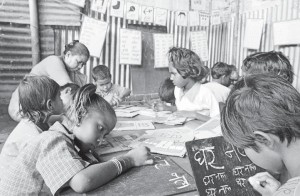What Right To Education?
 The three-year compliance
The three-year compliance
period for the Right to Education
(RTE) Act is just over. What
has the Act accomplished? Sadly,
not very much that is positive.
A key provision in the law
abolishes board examinations and
grants automatic promotion to
each child to the next grade at
the end of the academic year. It
also requires the award of a diploma
to all at the end of eight
years regardless of the knowledge
and skills acquired. It is
anybody’s guess what value
such a diploma will command in
the marketplace.
With rare exceptions,
teachers in India, especially in
government schools, have been
known for their absenteeism and
lackadaisical attitude towards
teaching. Student performance
in examinations offered one last
instrument to evaluate not just
students but teachers as well.
Therefore, it was widely predicted
that the abolition of examinations
would lead to increased
complacency among teachers
and reduce student achievements.
That prophecy has now come
true.
The latest Annual Status of
Education Report 2012 (ASER
2012), published by NGO
Pratham, documents an allaround
sharp decline in student
achievements from levels that
were already low. In just two
years between 2010 and 2012,
percentage of fifth graders in
public schools who can read second
grade-level text has declined
from 50.7% to 41.7%. Notwithstanding
the fact that 2012 was
designated the year of mathematics
in India, achievement levels
in arithmetic have fallen drastically.
Percentage of fifth graders
who could do a simple twodigit
subtraction with borrowing
has fallen from 70.9% to 53.5%
in two years.
RTE proponents had opposed
examinations because they
produce stress in children. But
for what kind of world does such
education prepare children? A
world that is waiting for them
with a life on a silver platter?
Would the real world give them
handsome salaries without performance
and evaluation? The
solution to illness is not to abandon
bitter medicine because it
might stress out the child but to
compassionately explain to her its
benefits.
Unfortunately, this is not
the end of the damage from the
RTE Act. Another important provision
in the law promises to do
to elementary education what our
labour laws have done to manufacturing.
The law requires all
schools to satisfy a set of highly
demanding input norms, most of
which have little to do with educational
outcomes. These norms
include allweather building with
playground, well-equipped library,
separate toilets for boys
and girls, fence around the
school, proper sports equipment,
maximum student-teacher ratio,
availability of art, health and
sports teachers and minimum
hours of instruction.
The deadline for these
norms was March 31, 2013. The
law requires government to now
withdraw recognition from all
schools falling below these
norms. Even more perniciously,
once recognition is withdrawn,
the government is to close down
the schools.
While I do not have ready
access to concrete figures, it is
a safe bet that half of the existing
schools, including many
owned by the government, do
not satisfy the prescribed input
norms. So if the law is enforced,
half of the schools will minimally
lose recognition and maximally
be closed down. But that would
surely violate many of the
children’s right to education.
Like our myriad internally
contradictory labour laws, all
parts of this law cannot be simultaneously
implemented.
Therefore, it is a fair bet that an
inspector raj would soon emerge
whereby bribes will be extracted
for delaying derecognition of
recognised schools that do not
meet the input norms and for letting
unrecognised schools stay
open. Of course, the real victims
will be the poor whose children
disproportionately populate these
schools and will have to pay
higher fees to cover the bribes.
Moreover, just as onerous
labour laws have discouraged the
expansion of labour-intensive
manufacturing in the organised
sector, the demanding input
norms in the RTE Act would discourage
the entry of new lowcost
private schools. Just as
labour laws hurt low-skilled
workers by hampering job creation,
RTE norms would deprive
the poor of quality education.
It is time that the United
Progressive Alliance did some serious
soul-searching and reconsidered
its approach to converting
every social and economic
goal into a right. I sometimes joke
that the willingness with which
the government has been obliging
vocal NGOs might soon bring
us a legal right to happiness.
It is not an accident that
the founding fathers placed economic
and social goals such as
those relating to education and
health in the directive principles
rather than fundamental rights.
Rights such as the freedom of
speech and religion and equality
before law regardless of race, religion,
caste and gender, originally
recognised as fundamental
rights, were “negative” rights
that courts could enforce
through “writs” when the state
violated them. In contrast, economic
and social rights require
“positive” action by the state,
which the courts cannot readily
enforce.
The founding fathers
also understood that unlike what
they classified as fundamental
rights, economic and social
rights were not absolute and
would vary over time and space.
The minimum acceptable
healthcare today may turn unacceptable
tomorrow and what is
acceptable to Bihar may not be
acceptable to Kerala.
Creating fundamental
rights that the government neither
intends to enforce nor has
wherewithal for undermines the
respect for the original fundamental
rights and makes a mockery
of the Constitution.
